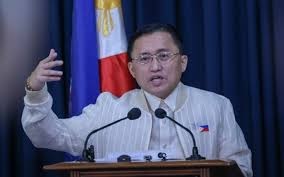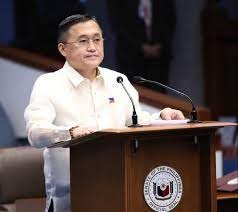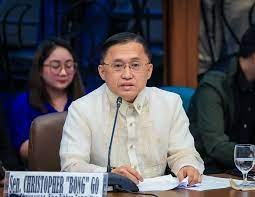The Philippines is currently engrossed in a highly contentious national debate surrounding alleged anomalies within the country’s crucial flood control projects. What began as an investigation into subpar or “ghost projects” has rapidly escalated into a fierce political and legal showdown, pitting a sitting Senator against mounting allegations of influence-peddling and protection of corrupt interests. At the heart of this storm is Senator Bong Go, who has vehemently denied any involvement, directly challenging investigators to pursue the true masterminds, while his staunch critic, former Senator Antonio Trillanes IV, prepares to file a plunder case linking Go to massive, anomalous contracts awarded during the previous administration.
This article dissects the core arguments presented by both sides, examining the Senator’s defense of “delicadeza” and the counter-claims suggesting a deliberate effort to deflect attention from those truly responsible.

🗣️ Senator Go’s Defense: A Call for Truth and Accountability
During a recent press conference, Senator Bong Go addressed the nation’s concerns, expressing his unwavering support for any and all investigations. His primary message was a passionate defense of his integrity and a challenge to the investigative bodies: “I welcome any investigation. Let the facts speak for themselves. I have nothing to hide, and I fear nothing because I am innocent. I am not involved in any anomaly.”
The Senator sought to frame himself as a champion of public trust and an ally in the fight against corruption, stating, “I am one with the Filipino people in this crusade against corruption… We must not allow the truth to be diverted.”
Challenging the Mastermind Narrative
A key element of Go’s defense revolves around the figure of the ‘Discayas’—contractors reportedly central to the anomalous dealings. While the Senate investigation has previously touched upon their activities, Go maintains that he does not know them. He highlighted his own actions during earlier Senate hearings, where he openly questioned the Discayas about their joint ventures and their completion status.
Go dramatically underscored his commitment to accountability by declaring his willingness to become the primary complainant against any wrongdoing, even if committed by his own relatives. “If there are failings, mistakes, or if projects are anomalous or substandard, hold them accountable,” he challenged. “I am willing to be the complainant even against my own kin.”
The Principle of “Delicadeza”
Throughout his statement, Senator Go repeatedly invoked the Filipino principle of “delicadeza,” a concept signifying propriety, ethical conduct, and honor in public service. He stressed that his entire career, especially his long association with former President Duterte, has been guided by this principle. He revealed past instances where he asserted his commitment to this ethical line, even threatening to resign if his relatives became involved in government transactions.
He further clarified his stance on his family’s business dealings, noting that his family had businesses long before he entered politics, and that he has never used his position to grant them favor or benefit from their ventures. He claimed that the construction company linked to his family, CLTG, is now retired (since 2022). He categorically denied any personal knowledge of or involvement in their joint ventures with the Discayas in 2017.
Go concluded by appealing directly to all witnesses and contractors: “Tell the truth. Do not allow the truth to be diverted… Let’s make those responsible, let’s make them accountable for all this mess.” He sees the current focus on him as a clear attempt by those truly culpable—the “real crocodiles” and “masterminds”—to execute a ‘cover-up’ and divert public attention.
⚖️ Former Senator Trillanes’ Counter-Offensive: The Plunder Accusation

In stark contrast to Senator Go’s defense, former Senator Antonio Trillanes IV presented a scathing counter-narrative, accusing Go of being the very mastermind behind the corruption and announcing his intent to file a P7 billion plunder case.
A Pattern of Corruption
Trillanes dismissed Go’s defense as a desperate attempt to manipulate the narrative. He pointedly suggested that Go himself is the ringleader the investigators should be targeting, stating, “He is the mastermind.”
The former Senator’s forthcoming plunder complaint reportedly hinges on the discovery of some P7 billion worth of government projects—including flood control and farm-to-market roads—allegedly awarded to the construction company linked to Go’s father and brother during the previous administration.
“This is the definition of plunder,” Trillanes asserted, emphasizing that any public official or their family member (first degree of consanguinity or affinity) who illegally benefits by over P50 million commits plunder. He argued that such massive contracts would have been impossible to secure without the direct influence of both Senator Go and the former President.
Scrutiny on the Discayas’ Retreat
Trillanes also offered a different perspective on the recent withdrawal of the Discaya couple from cooperating with the investigation (and from seeking to become state witnesses). While Go framed the retreat as part of a conspiracy to protect hidden interests, Trillanes suggested it was a necessary consequence of the investigation reaching higher up the ladder—specifically, to Go himself.
He argued that the Discayas were initially bold because they felt protected, but the shifting dynamics in the Senate Blue Ribbon Committee and the intense scrutiny compelled them to step back. Trillanes maintained that the name CLTG is an acronym for “Christopher Lawrence T. Go,” cementing the direct connection to the Senator.
Broader Crimes and the “Name-Dropping” Trap
Expanding his accusations beyond the flood control issue, Trillanes linked Senator Go to a wider array of historical controversies, including alleged involvement in extrajudicial killings and the questionable procurement of face shields during the pandemic—the infamous “Pharmally” scandal. He claimed that these acts were strategically executed to build up Go’s image, referencing the use of public funds for the Malasakit Center program as an example of a mechanism used to project a benevolent public image while allegedly engaging in larger-scale theft.
Trillanes concluded with a stern warning: “The law is painful… Even if one is popular, if they are stealing, it will come out.”
🚧 Analysis and Outlook

The dueling press conferences reveal a deeply polarized political environment where the search for truth is complicated by competing narratives and public trust is tested.
Go’s Strategy: His defense relies heavily on personal integrity (delicadeza), transparency in the investigation’s record, and directing focus toward the ‘masterminds’ to avoid being made the scapegoat.
Trillanes’ Strategy: His offensive is grounded in specific, large-scale financial allegations tied directly to Go’s family during his time in power, aiming to prove a systemic abuse of office that transcends the current flood control crisis.
The challenge for the Ombudsman, the Department of Public Works and Highways (DPWH), and the Inter-Agency Council Against Corruption (ICAC) is to cut through the political rhetoric and follow the paper trail. The integrity of these bodies will be judged on whether they can successfully establish accountability—whether it leads to the contractors, former officials, or the prominent figures now clashing in the public sphere.
The Filipino people are indeed watching, demanding that the investigation not be diverted and that the full truth about the misused funds and substandard projects finally be revealed. The pending plunder case and the ongoing probes promise a period of heightened legal and political tension.





